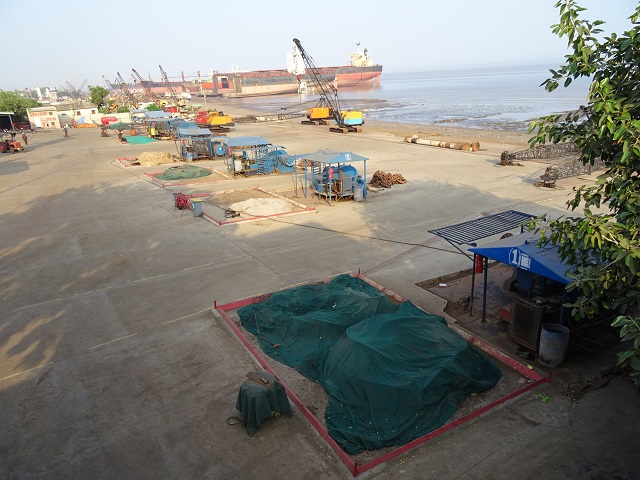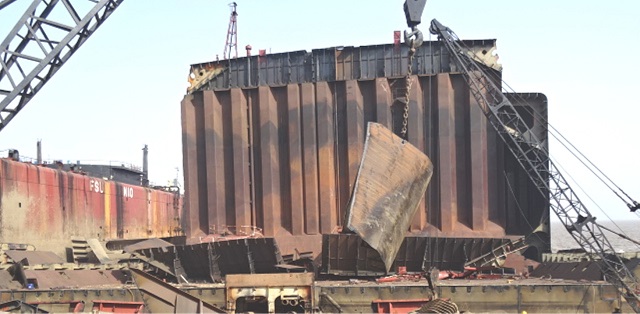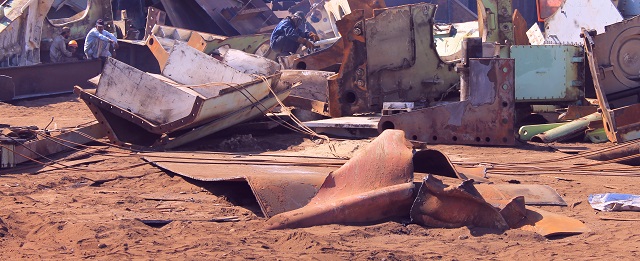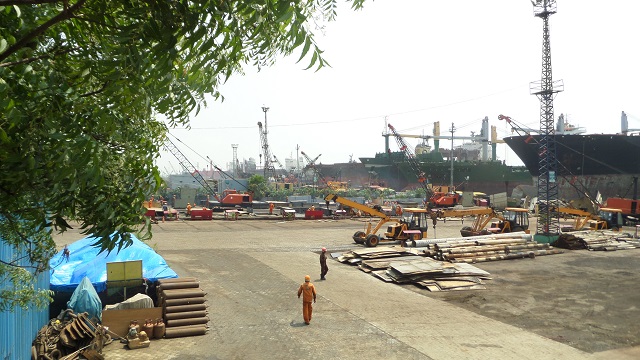Luring European Owners to Green Recycling Yards
The E.U. has decided to introduce its own ship recycling regulations, and a list of yards that are acceptable is expected to be released later this year. In the meantime, it is Asian shipowners, rather than European ones, that are supporting the recycling yards that have worked to achieve compliance with the IMO’s Hong Kong Convention.
The Priya Blue Industries ship recycling yard owned by Best Oasis in India is one of four yards in the Indian subcontinent that has been certified as compliant with the Convention. The parent company has been in business since 1992, and practices have changed a lot since then, says Viral Shah, Commercial and Technical Manager. “Not many European owners have come to the four yards that have achieved compliance certification. Rather, the Japanese and Korean owners have taken this into account, and they are specifically choosing the yards and only selling their ships to them.
“If more and more owners globally were to choose certified yards, it would be very beneficial for everyone here. There are still some owners who are just looking at the price, not at the certificates.”

Priya Blue Industries holds the Guinness Book World Record for recycling the largest ship ever built, the ST Mont ex Knock Nevis ex Jahre Viking. The company has made substantial investments in infrastructure in order to obtain ClassNK certification for compliance with the Hong Kong Convention. This included concrete flooring on the yard’s cutting zones. Ship processing is slower as a result of new procedures. Cranes are used to lift blocks which are then cleaned, whereas in some yards they are simply dropped on the beach as is and then cut down.
“It’s a slow process compared to other yards, but we have the advantage of having the biggest yard, along with a big backyard, in India, so it doesn’t make much difference to us,” says Shah.

Compliance hasn’t had a significant effect on international competition for Priya Blue either. “The most important aspect about recycling ships in India rather than China or Turkey is the price. The price that we offer in India is much better.”
Shah believes the industry is continuing to evolve as a result of the Convention. “It’s a good way ahead. Already quite a few yards have started following in our footsteps, and they are working towards compliance. Everybody is realising that this is the way to go. Change is coming.”
Interest in Green Recycling Grows
Hitesh Vyas, Vice President Middle East and Green Recycling Co-ordinator for cash buyer Wirana has seen increased interest in green recycling. “Four certified yards have been encouraged by shipowners who have agreed to pay a premium for green recycling of vessels,” he says. “This has encouraged more yards to work towards compliance in India, Pakistan and Bangladesh. Over a period of next one year we are likely to see more Hong Kong Convention certified yards.”
Wirana has been an ardent proponent of green recycling, and its yard R. L. Kalthia was the first to receive statement of compliance from ClassNK. Wirana has also sold vessels for green recycling to yards in Turkey and China.
Acceptability of Beaching Uncertain
The Hong Kong Convention has not yet entered into force, and the E.U. has enacted its own ship recycling regulation called the EUSRR which is applicable to all E.U.-flagged ships. “The EUSRR has generated lot of confusion because it initially mentioned that beaching was not an acceptable method,” says Vyas.
“It was later that they clarified that each facility will be verified individually and will not be disqualified purely on basis of method of recycling followed or its geographical locations. The E.U. is expected to come out with its first list of approved facilities by December 2016, although it is still to be seen whether ship recycling facilities using beaching or inter-tidal facilities will be approved. In the meanwhile, we have seen many shipowners associations from Europe as well as the Far East that have clearly expressed their full support to the Hong Kong Convention and Hong Kong Convention compliant facilities.”
A Divided Industry
The potential E.U. ban on beaching could have a most significant impact, said Dr Nikos Mikelis, non-executive director, of cash buyer GMS. “Unfortunately, it is not the positive impact that some commentators would lead us to believe.
“Two thirds or more of the world’s ship recycling is still conducted on beaches in South East Asia, and improving the working conditions and environmental impact of these yards is central to the Hong Kong Convention. By preventing the progressive and more CSR-savvy European market from using the Convention compliant yards in this region, which is what a ban on beaching would achieve, the E.U. regulation would torpedo the progress being made to improve the safety and sustainability standards of recycling,” says Mikelis.
Credit: GMS
“Without the demand that is currently filling the Hong Kong Convention compliant yards in South East Asia driving improvement through competition, one of the major driving forces for change would be removed.
“The E.U. regulation could create a false dichotomy between “clean” E.U.-approved recycling and “dirty” beaching. In reality, it is all a matter of management. It is just as possible to have clean, safe and sustainable recycling on a beach as it is to create an unsafe and polluting environment by recycling alongside a pier.
“All this regulation will achieve is to abandon the majority of the world’s ship-recycling infrastructure and workers to the realms of the non-compliant, not at all in line with the Hong Kong Convention’s high goals of raising standards at all yards across the world,” says Mikelis.
He says the only way forward is to improve the quality of the yards by committing “boots on the ground.” GMS has in-house Green Recycling Specialists that work closely with yards to work towards compliance with the standards established by the Hong Kong Convention and with its guidelines. These experts work on site to conduct various audits and present reports to ensure an added layer of supervision and compliance for responsible owners. They also liaise closely with the Ship Recycling Industries Association of India, Gujarat Maritime Board, the Ministry of Shipping and other governmental institutions and local organizations on yard-side issues.
Credit: GMS
NGO Not Welcome
The NGO Shipbreaking Platform highlights that European shipowners, government representatives of France, Germany and Belgium, and the European Commission are currently visiting shipbreaking yards in Alang, including Priya Blue.
Despite several indications that NGOs, including the NGO Shipbreaking Platform, would be part of the delegation, no NGO was invited to join in the end.
“We were clearly not welcome to join this visit. Critical civil society voices are not wanted in Alang – neither by shipowners, nor by the yards – this confirms the lack of transparency under which the yards in Alang operate,” said Patrizia Heidegger, Executive Director of the NGO Shipbreaking Platform.
 Credit: NGO Shipbreaking Platform
Credit: NGO Shipbreaking Platform
The delegation will not meet trade union representatives or workers, and will only visit a selection of very few yards, she says. The visit is organised by the European Community Shipowners’ Association. “It is an attempt by both shipowners and certain yards in India to convince European policy makers that yards in Alang should be approved for the upcoming E.U. list of accepted ship recycling facilities,” says Heidegger. “However, under the European Ship Recycling Regulation and the recently published technical guidelines on the requirements for ship recycling facilities, it is clear that beaching facilities do not qualify for the E.U. list.”
Training on Compliance
Lucion Marine, in a joint venture partnership with Arcadis, recently won a contract awarded by the European Commission to provide advisory services on the E.U. Ship Recycling Regulations to help shipping operators and shipyard owners properly understand what is required to achieve compliance. This information program will begin with seminars already been confirmed for China and Turkey, with possible others to follow in due course.
Hazardous material management on board marine vessels and offshore platforms is now one of the most complex and growing requirements for maritime operators across the globe, says Phil Rozier, Director of Lucion Marine. “Shipping operators face various requirements to adhere to all manner of international regulations and statutory documentation – and knowing all the appropriate procedures relating to the running and decommissioning of a marine vessel is not an easy task.”
Importantly, for shipowners, using those facilities included on the E.U. list will be the only guarantee that their end-of-life vessels are not causing harm to workers and the environment, says Rozier, which is the fundamental purpose of the ship recycling regulations.
Deaths Continue
Meanwhile, the industry continues to hear about the negative impacts of current shipbreaking practices and workers’ rights. The NGO Shipbreaking Platform reports that, in the first quarter of 2016, 239 large commercial vessels were sold for breaking, 189 of these were beached in South Asia, and so far this year, at least seven workers have lost their lives at the ship breaking yards in Bangladesh.
The opinions expressed herein are the author's and not necessarily those of The Maritime Executive.


.JPG)